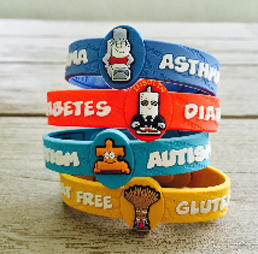
The Proper Steps For Testing Your Child For Celiac Disease
In honor of Celiac Awareness Month, we asked Margaret Clegg from Mi Gluten Free Gal to guest blog for us about testing your child for Celiac Disease.
Your child is not feeling well. They’re tired, their stomach hurts, and they all around don’t feel right. You’ve searched WebMD, looking for possible answers.. Maybe you’ve had a friend mention similar symptoms, or a family member who has been diagnosed, and they’re urging you to test your child for Celiac Disease. It all seems a bit overwhelming and you just want to help your child feel better. Here are a few pointers to guide you in your journey:
DON’T CHANGE THEIR DIET!
I’ve heard so many heart breaking stories of people who’ve stopped eating gluten prior to getting tested, only to be told to reintroduce it to their diet. That often leads to stress and discomfort. All of the accurate testing methods we have to date require the consumption of gluten, so don’t change what you’re feeding your child, just yet. They need to be eating the equivalent of at least a slice of regular bread every day for test results to be accurate.
Maybe you’re thinking, “If they feel better eating gluten-free, what’s the difference?” There’s a lot of difference, according to the University of Chicago Celiac Disease Center. There are three medical issues linked to wheat (wheat allergy, Celiac Disease, and Non-Celiac Gluten Sensitivity) that are distinctly different and require different treatments. Celiac Disease has many associated health issues, and it is important to have an accurate diagnosis to make sure you are getting proper follow-up care. Also, children with Celiac Disease qualify for a 504 plan while in school, to make sure the school understands their disease and keep them safe.
Ask Your Doctor to Run Some Blood Tests
Celiac panel – As of today, the best test is “tTg-IgA”. This is short for Tissue Transglutaminase Antibodies. It is highly accurate and is positive in 98% of those with Celiac Disease. It is also low in what we call “false positives.” This means that it will accurately come back negative in 95% of those who do NOT have Celiac Disease. Because there is some wiggle room, doctors usually run these additional blood antibody tests-
EMA, total serum IgA, and DGP. Also please know, that as great as science is, it is still possible for lab tests to come back with a false negative. If you still feel awful, and especially if you have a family history of Celiac Disease, continue to consult with your doctor. Share this guide from the Celiac Disease Foundation if they seem unsure of what tests to run.
DNA test– Science has made great advancements in mapping the human genome. Scientists have now been able to decipher where the sequences of Celiac Disease reside on our genetic makeup. At this point, genetic testing can only be used to rule out Celiac Disease. Doctors state that if you do not test positive for HLA DQ-2 or HLA DQ-8, you cannot have Celiac Disease.
Meet with a Knowledgeable Gastroenterologist for an Upper Endoscopy
My endoscopy was pretty easy. I didn’t need to drink any junk (that’s for a colonoscopy) and I had to not eat anything for about 10 hours prior to my procedure. Once I was in the procedure room, they were finished in less than 15 minutes. And I was under complete anesthesia the whole time. During an endoscopy, they stick a small tube with a camera in it to visibly inspect your esophagus, stomach and the duodenum (top part of the intestines.) They also take small bits of tissue, called a biopsy. Tiny, tiny bits of tissue. Small, barely there bits that go under a microscope. These bits are tested and inspected for damaged villi, which are responsible for absorbing our nutrients.
Make sure that your GI is taking at least 6 samples from various places in the duodenum. This medical standard is better explained in the University of Chicago Celiac Disease Center’s explanation of an endoscopsic biopsy. Here’s a short video that shows what an endoscopy is like. The Celiac Disease Foundation has a provider directory on their website to help you find a gastro that is highly knowledgeable in diagnosing this disease
Meet with an Educated Dietitian and Others who are Knowledgeable about the Diet
So your child has been poked and prodded, and the results come back that your child definitely has Celiac Disease. Now what? The short answer, remove gluten from your diet. The long answer- it’s not quite that simple. At this point you’re simply wondering “what is gluten and where does it hide?”
This is where a good dietitian who is versed in Celiac Disease is a good place to start. I would again use the CDF provider directory to try to find one. Remember, dietitians have to learn A LOT in school, and some may not be well versed in Celiac Disease, This is why I would also suggest finding a local Celiac Disease support group. Many groups have a dietitian who advise their group as well. Many support groups have children’s groups and activities as well. R.O.C.K. (Raising Our Celiac Kids) is the most well known of these groups.
There are lots of good online resources for those of us who are newly diagnosed. The Celiac Support Association, the Celiac Disease Foundation, and Beyond Celiac are all organizations devoted to helping those with Celiac Disease. They all excel at certain aspects of Celiac Disease management. The University of Chicago Celiac Disease Center is an excellent resource as well. They offer a free care package for those who are newly diagnosed by biopsy. The also offer a free E-book to help you “Jump Start” your gluten-free lifestyle.
Hopefully I’ve given you some information that’s been helpful. I will state clearly that I’m not a doctor, dietitian, nurse or “certified” medical professional.But I am fellow Celiac Disease patient. I am a support group chair, an advocate and a fellow “gluten free gal.” I’m walking this journey with you, every step if the way.
Margaret Clegg was born and raised in Michigan and resides in Flint. She is a Central Michigan University graduate and the proud wife of an amazing husband and owner of two adorable dogs. She is a passionate advocate for Celiac Disease and works with many organizations within the state to help those with these special needs. She’s a proud MSU fan and loves ice cream. You can find her on Twitter, Instagram, Facebook, Pinterest and Periscope at @miglutenfreegal.







